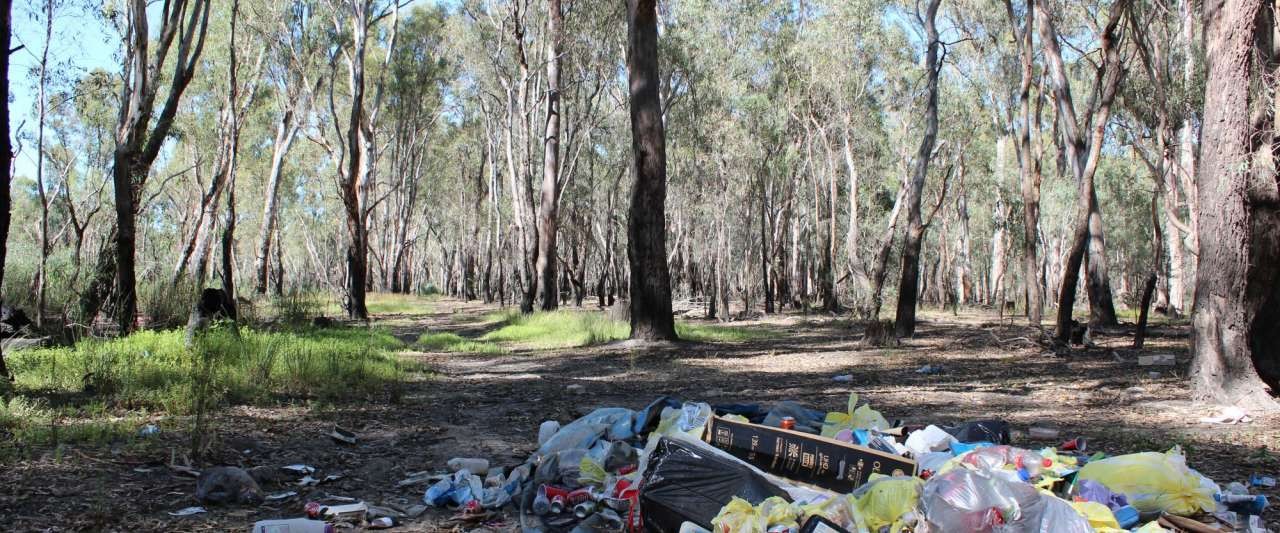Reporting illegal dumping and littering

The deliberate or unauthorised dumping, tipping or burying of waste or litter is illegal.
Illegal dumping of waste or littering can cause significant environmental issues including contaminating land, polluting waterways, increasing the risk of fire and causing harm to local wildlife and their habitats. Cleaning up dumped litter and prosecuting offenders costs the community thousands of dollars each year.
We need your help to reduce illegal dumping or littering.
How to report illegal dumping or littering
If you witness someone dumping waste or littering or have come across dumped rubbish:
- Do not approach the vehicle or individuals who are illegally dumping.
- Do not let the illegal dumpers know you are there.
- Do not touch the illegally dumped material for your own safety.
- Record as much detail as possible, for example: vehicle make, model, registration number, colour, details of where the litter was deposited and the date and time it occurred.
Report the litter or illegal dumping to one of the following organisations:
Greater Shepparton City Council
Community Rangers are authorised to investigate illegal dumping and litter offences within the Greater Shepparton City Council municipality. Contact Council.
Environment Protection Authority (EPA)
The EPA are authorised to investigate illegal dumping and litter offences throughout Victoria. Illegal dumping and litter reports can be submitted by one of the following ways:
- Telephone: 1300 372 842 (1300 EPA VIC)
- EPA Website: Report online
Parks Victoria
Parks Victoria Officers are authorised to investigate illegal dumping and littering within National Parks and State Parks in Victoria.
- Telephone: 13 19 63
- Email: info@parks.vic.gov.au
Enforcement
Council, the EPA and Parks Victoria have officers authorised under the Environment Protection Act 1970 to investigate and prosecute those that illegally dump waste and litter.
Officers may issue on the spot fines of over $300 or commence legal action. The maximum court penalty for illegal dumping is $610,700 or seven years imprisonment for an individual, and more than $1.2 million for a corporation.
What is illegal dumping?
The Environment Protection Authority defines illegal dumping as the deliberate or unauthorised dumping, tipping or burying of waste on land that is not licensed or fit to accept that waste. Illegal dumping can range in scale from a single bag of household rubbish to large household items and can include leaving waste or household items on the nature strip, or dumping rubbish in bushland.
Items commonly dumped include:
- TVs, appliances and electronic waste
- furniture
- mattresses
- industrial waste
- building, construction and demolition materials
- garden waste
- packaging including cardboard and polystyrene
- tyres
- cars
- soil
What is littering?
Littering includes:
- litter or rubbish thrown from vehicles
- leaving waste and donated items outside an op-shop when the shop is closed
- cigarette butts tossed onto the ground or out of a moving vehicle
- stormwater pollution from litter left in the streets, garden waste swept into gutters or chemicals washed into gutters
- dog poo not picked up
- shopping bags
- litter left during rubbish bin collections
- junk mail
- bill posters
Why is illegal dumping a problem?
Illegal dumping can threaten wildlife and lead to long-term contamination of land, waterways and groundwater, particularly when the waste is from an industrial source or contaminated soil.
- Green waste dumped in bushland introduces noxious weeds and pests into the environment.
- Plastic makes its way into local waterways, killing native fish and platypus.
- Waste dumped near residents can contribute to an unsightly environment that looks and feels unsafe.
- Illegal dumping in bushland, National parks, State parks and near tourist attractions can negatively impact local tourism.
- It costs the local community over $150,000 each year to clean up and dispose of illegally dumped waste.
- Many items illegally dumped can be reused or recycled.
Alternatives to illegal dumping
- Council provides three resource recovery centres where common household waste items can be disposed of, as well as commercial quantities of items such as timber, concrete and garden waste. Some items are accepted free of charge.
- Some items can be resold or recycled. The resource recovery centres at Ardmona and Shepparton have resell shops where good quality items can be repurposed by community members. Some local businesses accept unwanted items such as household appliances, metal and vehicles free of charge.
- If the items are in good clean condition, consider donating to your local charity organisation such as the Salvation Army or St. Vincent De Paul. Donations can be made during op-shop opening hours.
- Alternatively, you may consider selling your unwanted items online or through a buy-swap site.
- If you’re unsure of how or where to dispose of items visit our How Do I Dispose Of... page or contact Council.

